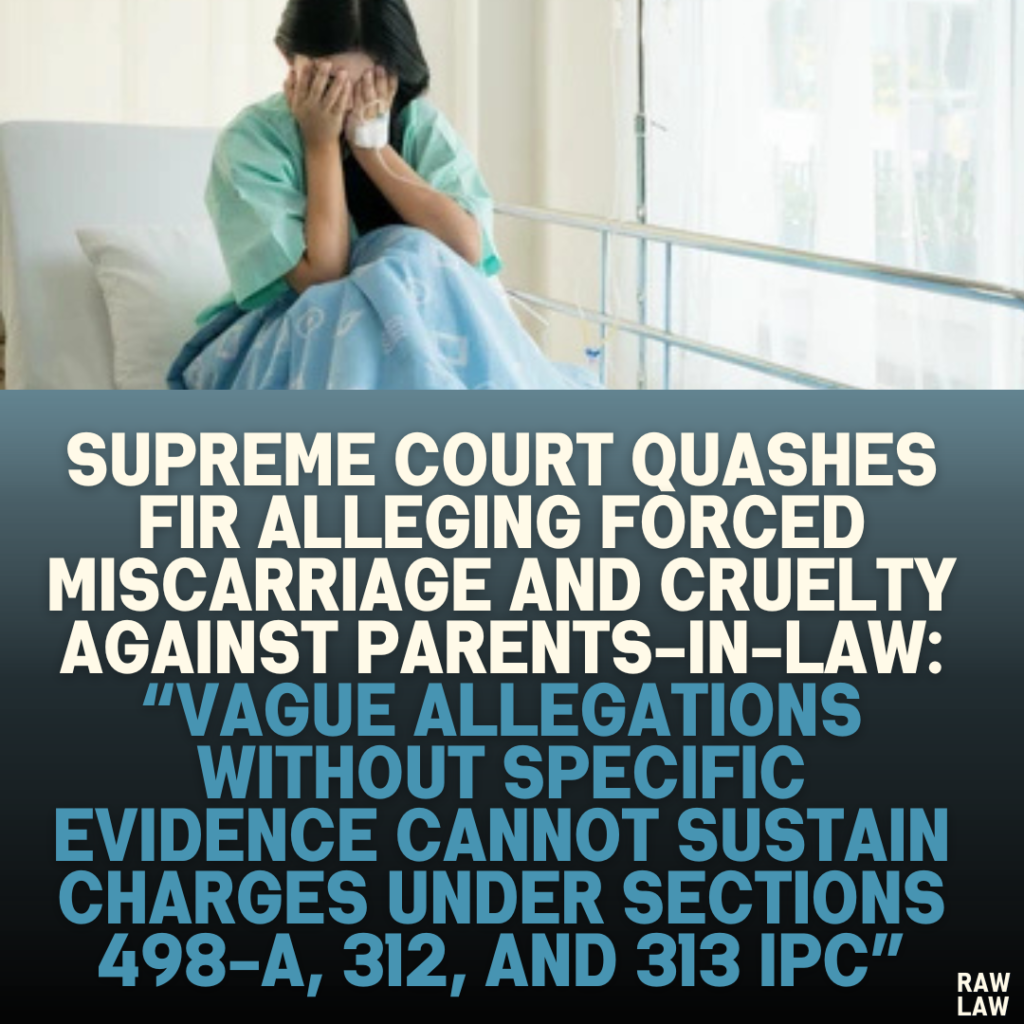Court’s Decision:
The Supreme Court allowed the appeal filed by the appellants (parents-in-law of the complainant) and quashed the FIR registered under Sections 498-A, 312, 313, and 34 of the IPC. It observed that the allegations made in the FIR were vague and lacked specific evidence to substantiate the charges. The Court found that the proceedings were initiated with an ulterior motive and held that continuing such criminal proceedings would result in an abuse of the process of law.
Facts:
- Marriage and Allegations:
- The complainant married the appellants’ son in 2006, and they had two daughters.
- After the birth of the second daughter in 2011, the complainant alleged that her husband and in-laws harassed her for not bearing a male child.
- Incident of Miscarriage:
- In November 2016, the complainant alleged that the appellants forced her to consume poisoned food during a visit, leading to a miscarriage.
- Medical treatment was sought later, during which remnants of the fetus were removed surgically.
- Marital Discord:
- The complainant moved out of the matrimonial home in February 2018 due to alleged harassment.
- The Family Court granted a decree of divorce by mutual consent in May 2019.
- Filing of FIR:
- In 2018, the complainant lodged an FIR accusing her in-laws of cruelty and causing her miscarriage. The chargesheet was subsequently filed in 2021.
Issues:
- Whether the allegations of harassment and forced miscarriage under Sections 498-A, 312, and 313 IPC were substantiated by specific evidence.
- Whether the FIR was filed as a bona fide complaint or as a retaliatory measure after the divorce proceedings.
Petitioner’s Arguments:
- Lack of Specificity:
- The appellants argued that the FIR did not provide specific details of harassment or cruelty, making the allegations vague and omnibus.
- They contended that no evidence directly linked them to the alleged forced miscarriage.
- Timing and Motive:
- The appellants highlighted that the FIR was filed two years after the alleged incidents and after the notice for divorce, suggesting an ulterior motive to pressure them.
- Medical Evidence:
- The chargesheet contained the doctor’s statement, which indicated that the miscarriage was caused by abortion pills, not by any act of the appellants.
- Misuse of Law:
- The appellants argued that the complaint was filed to harass them and misuse criminal law provisions.
Respondent’s Arguments:
- Prima Facie Case:
- The State argued that the allegations disclosed offences under Sections 498-A, 312, and 313 IPC and should be examined at trial.
- Role of Appellants:
- It was contended that the appellants instigated their son to harass the complainant and played an active role in causing the miscarriage.
Analysis of the Law:
- Section 498-A IPC:
- The Court emphasized that vague and general allegations of cruelty without specific evidence do not meet the legal threshold for prosecution under this section.
- It referred to judgments like Dara Lakshmi Narayana vs. State of Telangana, which highlighted the misuse of Section 498-A in matrimonial disputes.
- Sections 312 and 313 IPC:
- These sections pertain to causing miscarriage, with Section 313 addressing instances without the woman’s consent.
- The Court found no evidence to establish the appellants’ involvement in administering any substance to the complainant.
- Principles of Quashing Proceedings:
- Referring to State of Haryana vs. Bhajan Lal, the Court outlined circumstances where proceedings could be quashed, including cases of inherently improbable allegations or proceedings initiated with mala fide intent.
Precedent Analysis:
- In Dara Lakshmi Narayana vs. State of Telangana, the Court quashed proceedings based on vague and generalized allegations of cruelty against the husband’s family members, noting that such complaints are often retaliatory.
- In Jayedeepsinh Pravinsinh Chavda vs. State of Gujarat, the Court clarified that “cruelty” under Section 498-A must involve specific acts of grave injury or coercion to meet unlawful demands.
- The principles laid down in Bhajan Lal guided the Court in evaluating the validity of the FIR.
Court’s Reasoning:
- Lack of Specific Allegations:
- The allegations in the FIR did not specify particular acts or evidence to substantiate claims of harassment or forced miscarriage by the appellants.
- Delay in Filing FIR:
- The FIR was filed long after the alleged incidents, raising doubts about its credibility.
- Medical Evidence:
- The chargesheet indicated that abortion pills caused the miscarriage, with no evidence connecting the appellants to administering these pills.
- Motive:
- The timing of the FIR, post-divorce proceedings, suggested it was filed as a retaliatory measure to pressure the appellants.
Conclusion:
The Supreme Court held that the FIR and related proceedings were baseless, vague, and lacked sufficient evidence. It quashed the FIR and set aside all related criminal proceedings against the appellants.
Implications:
This judgment underscores the judiciary’s caution against the misuse of criminal law in matrimonial disputes. It reaffirms the necessity of specific and substantial evidence to sustain allegations under Section 498-A IPC, protecting individuals from baseless harassment while ensuring genuine cases are addressed appropriately.




Pingback: Delhi High Court Directs Expedited Implementation of PM-ABHIM Scheme: Mandates MoU Signing to Ensure Pandemic-Resilient Healthcare and Avoid Depriving Delhi Residents - Raw Law